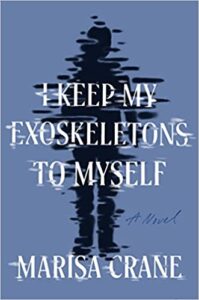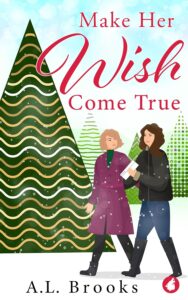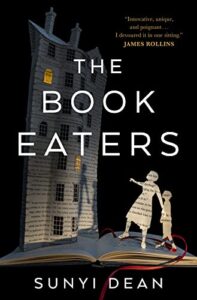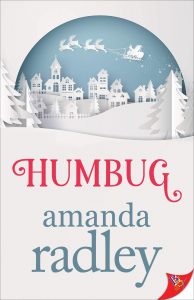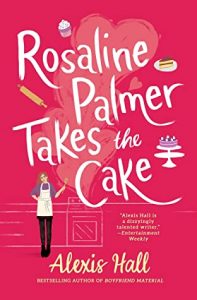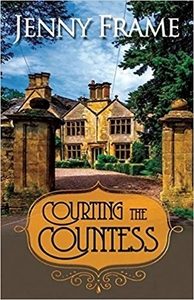Buy this from Bookshop.org to support local bookstores and the Lesbrary!
I Keep My Exoskeletons to Myself follows Kris, a recent widow, as she navigates the world of Shadester and NoShad while raising the child that her wife, Beau, died giving birth to. She has to deal with her own two shadows and with the baby’s two shadows as the kid grows up. Along the way, we get to see what a speculative dystopia where any sort of crime, even accidental, is met with an additional shadow being tacked onto your person would be like.
What initially drew me in is the novel’s point of view. It is told in first person, but a lot of the time, Kris is addressing Beau directly using the “you” pronoun. There are also sections that aren’t really a point of view at all. Formatted as quizzes and impossible crosswords, Crane paints a picture of grief and its aftereffects. The child Kris and Beau have together is simply referred to as “the kid” in most instances; the reader doesn’t find out her actual name until close to the very end of the novel. At first, I was wary of this choice to not name her, but Crane wound up pulling it off spectacularly, coinciding the reveal of the name with Kris’s personal growth from “person who is taking care of this child” to “person who accepts their role as mother to this child.” It really drove the point of Kris’s grief home, and the reveal happened at the perfect time, both for Kris and for the reader.
The world being split into Shads and NoShads was also really interesting. Championed by a president who mirrors a particular former president of ours, the system of shadows is just a way to punish people publicly. Make one mistake—like Kris, who won’t tell us how she got her extra shadow until she’s practically forced to—and you’re marked forever, gifted another shadow in front of everyone who comes to watch the ceremony. Shads are looked down on in society. They only have one day a week where they can grocery shop; Kris is told multiple times that homeschooling the kid is the better option to keep her away from everyone else; and it is all too easy to gain more shadows after you’ve been given your first. The kid receives her second shadow nearly the moment she is born due to Beau’s death, and the world is made so much harder for her to navigate due to something she wasn’t even consciously aware of doing. The government installs cameras in every house and every business, watching twenty four/seven for anyone to make a mistake worthy of an extra shadow. Kris is pretty anxious even before she gets hers. She struggles with her desire for sex that involves BDSM, but that’s the only real issue anyone faces in the sexual identity department. Another thing I liked: everyone in this book is just unapologetically queer. Despite being made of Shads and NoShads, the universe here is a reflection of our own, so it was nice to read about gay and queer folks finding ways to be happy in crappy situations. Honestly, it felt sort of refreshing.
This world is so full and detailed, and I loved getting to explore it with Kris and her rebellious kid who refuses to listen to the rules. However, there was one particular part of the writing that tore me out of the story time after time after time, and it’s how the story is told. In the beginning of the book, we bounce from paragraph to paragraph. There is hardly a single page without some kind of section break for the first one hundred pages; for most of those pages, there’s multiple section breaks, seemingly for no reason. A lot of the story is told through one paragraph at a time. It was disorienting as a reader to bounce from place to place like that so often. I get why Crane did it. They wanted to write in a way that mimicked Kris’s grief. Kris goes back and forth between addressing Beau, along with her past with Beau, and telling the story of her growing child. Maybe, for that reason, it’s meant to be disorienting. Kris can’t tell a cohesive narrative yet because she doesn’t know how to without Beau next to her. However, I had to continuously take breaks from reading in order to digest everything and to get to a point where I wanted to read it again. As the story progresses, the formatting becomes more standard, and we eventually transition almost entirely to regular paragraph and section breaks. Again, this is a reflection of Kris’s grieving process. The easier it gets for her to live in a world post-Beau, the easier it is to read. I just wish I had known about it before I started reading. I don’t think it would have kept me from picking up the book; it just would have been nice to know what to expect.
Spoilers for ending:
The ending of this book was also pretty lackluster to me and felt super rushed, but someone who likes endings where everything turns out great and perfect all of a sudden would be a big fan. I am simply not the person who likes those. Everything just fell in place too perfectly for me. We go through all of these specific trials and tribulations with the world that Crane has built, and then some of the problems just…disappear. However, it’s a happy ending; I can’t be mad about that.
Trigger warnings for: death, bodily harm, drug abuse, homophobia, and BDSM. There is also a chunk of the book dedicated to the kid’s attempt to find out who her biological father is with some tense family dynamics related to her wants.

